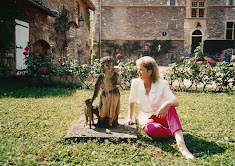|
ESPAÑOL
|
INGLÉS
|
|
TENER - Mi hermana TIENE 28 años.
|
To BE –
My sister IS 28 years old.
|
|
“ -
Yo TENGO hambre.
|
To BE - I AM hungry.
|
|
“ -
Ellas TIENEN frío.
|
To BE - They ARE cold.
|
|
LLEGAR - Nosotros LLEGAMOS tarde.
|
To BE - We WERE late.
|
|
HACER - HACE frío.
|
To BE - It IS cold.
|
|
HABER (impersonal) - HAY niebla.
|
To BE - It IS foggy.
|
|
HACER
– Ella ha HECHO sus deberes
|
To DO -
She has DONE her homework.
|
|
“ -
Nosotros HACEMOS la compra
|
“ - - We DO the shopping.
|
|
“ -
Tú HACES las labores del
hogar
|
“ - - You DO the housework.
|
|
“ -
¡YO lo HAGO lo mejor que
puedo!
|
“ - - I
DO my best !
|
|
“ -
¡ HAZ algo!
|
“ - - DO something!
|
|
“ -
¡ HAZlo bien!
|
“ - - DO it well !
|
|
“ -
¡HAGAMOS deporte!
|
“ - -
Let’s DO sport!
|
|
“ - Mi abuela HIZO un pastel
|
“ - -
My grandmother MADE a cake.
|
|
“ -
Yo he HECHO un error.
|
“ - - I have MADE a mistake.
|
|
“ -
Te voy a HACER una oferta.
|
“ - - I am going to MAKE you an offer
|
|
“ - Permíteme HACER una sugerencia.
|
“ - -
Let me, to MAKE a suggestion.
|



No hay comentarios:
Publicar un comentario
Nota: solo los miembros de este blog pueden publicar comentarios.